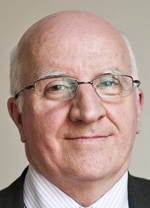 David Cameron this week announced a consultation that could lead to custodial sentences for those in the public sector who fail to protect vulnerable children and young people. This is one of a number of recent developments in the field of safeguarding that has implications for the Church in England and Wales.
David Cameron this week announced a consultation that could lead to custodial sentences for those in the public sector who fail to protect vulnerable children and young people. This is one of a number of recent developments in the field of safeguarding that has implications for the Church in England and Wales.
While the government consultation has come in response to recent cases of horrendous trafficking in Oxford and Rochdale, it raises questions. Why has the Government not introduced mandatory reporting of abuse allegations? Since the publication of the Nolan Report in 2001 the Catholic Church has been required to refer any allegation to the statutory services.
A number of reviews into serious abuse or neglect of children, while showing real failings, have also shown serious resource issues with social workers expected to carry unrealistic case loads. That injustice must be addressed – the service must be properly resourced.

It would also be difficult to enact laws that relate to only a certain group of people – thus any realistic legislation on the handling of allegations should apply to anyone with responsibility for children, young people and adults at risk, in any setting. I would expect the legislation to include any Catholic organisation be it parish, school or care home.
The work of the public inquiry into historic child abuse will no doubt gather momentum after the general election. At long last the inquiry has a chairwoman – the New Zealand High Court judge Lowell Goddard – who appears to be acceptable to all, especially to abuse survivors. Given her background I think it will be robust in every way. It will have statutory powers and be able to demand documentation and call anyone to appear.
While the progress we have made in the Church with national structures, procedures and protocols may be recognised, our consistency in all these areas will, I am sure, be investigated and tested in the course of the inquiry. Any survivor of abuse will have the opportunity to share their experience and any concerns and views about how they were treated. Diocesan bishops and Religious leaders may be called to respond to such matters and give evidence under oath.
BBC Radio 4 recently ran a documentary on the influence of insurance companies on local authorities dealing with allegations of abuse. In one instance a councillor claimed the council they worked for had been threatened with the withdrawal of liability cover if it proceeded with an inquiry.
Insurance companies have a job to do and legal procedures to follow – but the allegation outlined above seems to move beyond that. In the Church, liability remains an area of tension, and a regular complaint from victims and survivors is that they are not able to meet senior leaders in the Church or receive an apology because of liability issues.
We have a pastoral support working group looking at these issues to find a truly pastoral way forward. I believe this issue will be raised by victims and survivors of abuse at the public inquiry.
The Church in England and Wales should be grateful for the diocesan and Religious co-ordinators who provide expertise and support in safeguarding. That is where the real work is done. The National Catholic Safeguarding Commission and the Catholic Safeguarding Advisory Service need to work even more closely with dioceses and Religious congregations so that we truly are one Church in our safeguarding work. That sense of unity and vision will be seriously called to account, not least throughout the public inquiry.
Danny Sullivan is the chairman of the National Catholic Safeguarding Commission
Above: Oxford's famous skyline.


 Loading ...
Loading ...
What do you think?
You can post as a subscriber user ...
User comments (0)